Fox News Decision Desk projects Rick Scott Senate re-election win in Florida
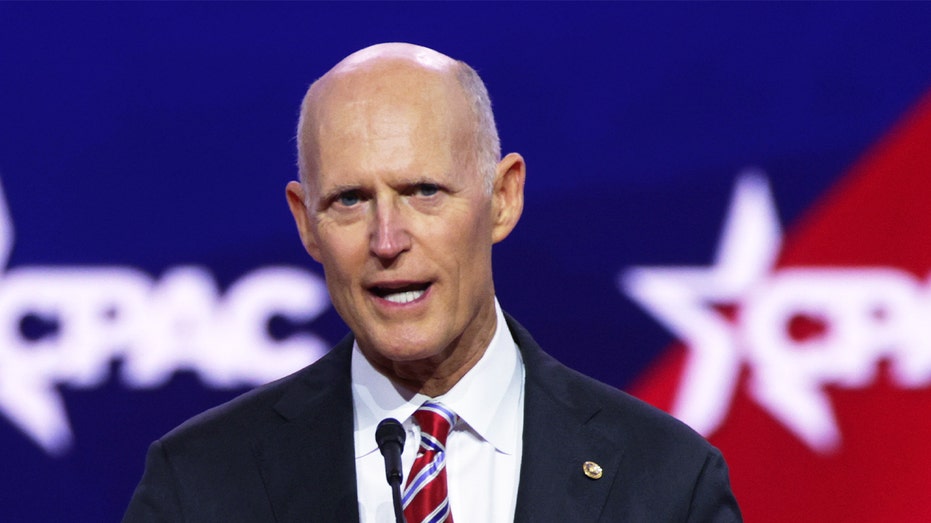
Republican Sen. Rick Scott is expected to win re-election to the Senate in Florida, and secure a second term in the upper chamber. The Fox News Decision Desk projected Scott would win his race on Tuesday night. Before running for Senate, Scott served two terms as the 45th governor of Florida, from 2011 to 2019. Scott, who has served one term in the Senate, was challenged by Democrat Debbie Mucarsel-Powell for the seat representing the Sunshine State. DEMS POUR $25M INTO GROUND GAME AS GOP INCHES CLOSER TO SENATE MAJORITY Mucarsel-Powell previously served one term representing Florida’s 26th Congressional District from 2019 to 2021, before being ousted by Trump-backed Rep. Carlos Gimenez, R-Fla., in 2020. BIDEN’S PREFERRED CANDIDATE, MUCARSEL-POWELL, WINS FLORIDA DEM SENATE PRIMARY The Democrat immigrated to the U.S. from South America with her mother and sister when she was young, and said the reason for launching her Senate bid was because “our democracy, our economy, and our rights are all on the line,” according to her campaign website. During his campaign for re-election, Scott was also running in a separate race within the Senate GOP conference, announcing in May his candidacy for Republican leader in the next Senate. The Republican senator will face opponents Senate Minority Whip John Thune, R-S.D., and Sen. John Cornyn, R-Texas, who are also eyeing Senate Minority Leader Mitch McConnell’s long-held position.
Longtime state attorney general elected governor in this red bastion
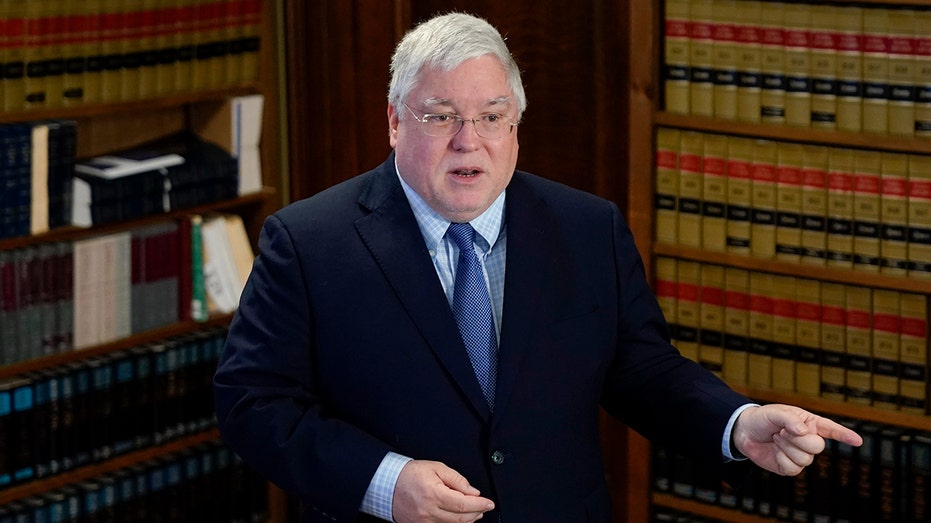
The Fox News Decision Desk projects that Republican state Attorney General Patrick Morrisey of West Virginia will succeed GOP Gov. Jim Justice as the red-leaning state’s governor. Morrisey is projected to defeat Democratic nominee Steve Williams, the mayor of Huntington, the state’s second most populous city. West Virginia, once a state where Democrats dominated, has shifted far to the right in recent election cycles. CLICK HERE FOR THE LATEST FOX NEWS 2024 ELECTION RESULTS Former President Trump carried the state by 39-points four years ago and by 42-points in the 2016 election. Morrisey, 56, has served as West Virginia’s attorney general since 2012. Justice was term-limited as governor and ran this cycle for the state’s open Senate seat. Republican Governors Association chair Gov. Bill Lee of Tennessee said in a statement that “Governor-Elect Patrick Morrisey has proven himself as a relentless defender of West Virginia’s conservative values and a national leader in the fight against the Biden Administration.” Get the latest updates from the 2024 campaign trail, exclusive interviews and more at our Fox News Digital election hub.
Fox News projects Justice victory in West Virginia as GOP flips Senate seat
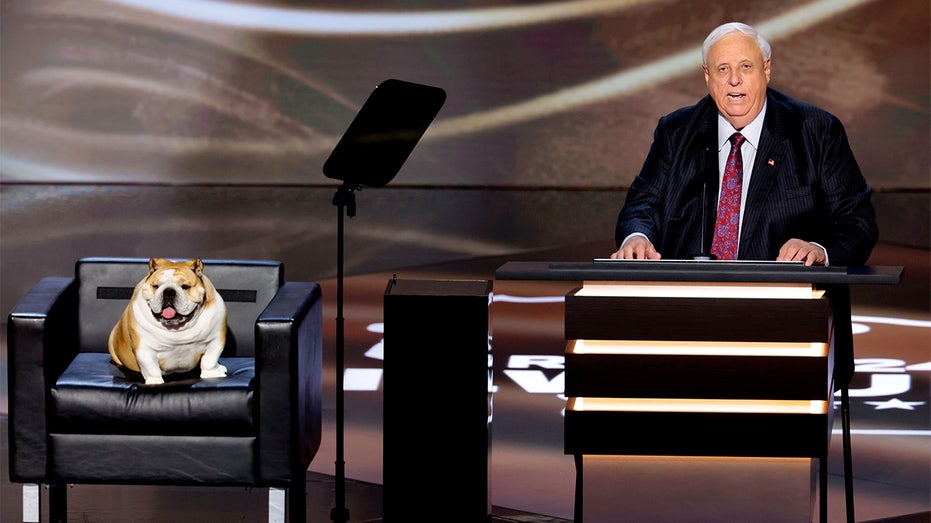
It was never in doubt, and now it’s official—the GOP is projected to flip a Senate seat in dark red West Virginia that was long held by the Democrats. The Fox News Decision Desk has projected that Republican Gov. Jim Justice of West Virginia will defeat the Democrat Party’s nominee—Wheeling mayor Glenn Elliott. Justice, a billionaire businessman and coal mining magnate who owns the luxury Greenbrier Resort in White Sulphur Springs, West Virginia, will succeed Sen. Joe Manchin, a former governor and longtime Democrat who switched to being an independent in May after being at loggerheads with national Democrats for years. After Manchin announced last year that he wouldn’t seek re-election in a one-time Democrat-leaning state that then-President Trump won by nearly 40 points in the 2020 election, political pundits pointed to an extremely likely pickup by Republicans as they aimed to win back the Senate majority at the ballot box this year. HEAD HERE FOR THE LATEST FOX NEWS ELECTION RESULTS With Justice’s victory, Republicans will control both of West Virginia’s two Senate seats for the first time in nearly a century. Justice, with the support of Trump, easily defeated conservative Rep. Alex Mooney, R-W.Va., in a contentious GOP primary earlier this year. Elliot, who had the backing of Manchin, won a three-way battle for the Democrat Party nomination. The governor this year grabbed national attention for BabyDog Justice, his English bulldog who has regularly accompanied Justice at public and political engagements. And Babydog stole the show, as Justice’s pet appeared with the governor as he spoke during the second night of the Republican National Convention, in Milwaukee, Wisconsin in July. Justice ran for West Virginia governor as a Democrat in 2016, winning by single digits. He re-registered as a Republican the next year after holding a rally with then-President Donald Trump, and he overwhelmingly won re-election in 2020. Justice was term-limited from seeking re-election as governor this year. Manchin, known as a centrist or moderate Democrat, was elected governor in 2004 and easily re-elected in 2008. The governor won a 2010 special election to fill the Senate seat left vacant by the death of longtime Democrat Sen. Robert Byrd. He won a full term in 2012 and narrowly won re-election again in 2018. Get the latest updates from the 2024 campaign trail, exclusive interviews and more at our Fox News Digital election hub.
Blue state Republican governor wins re-election to a fifth term in office
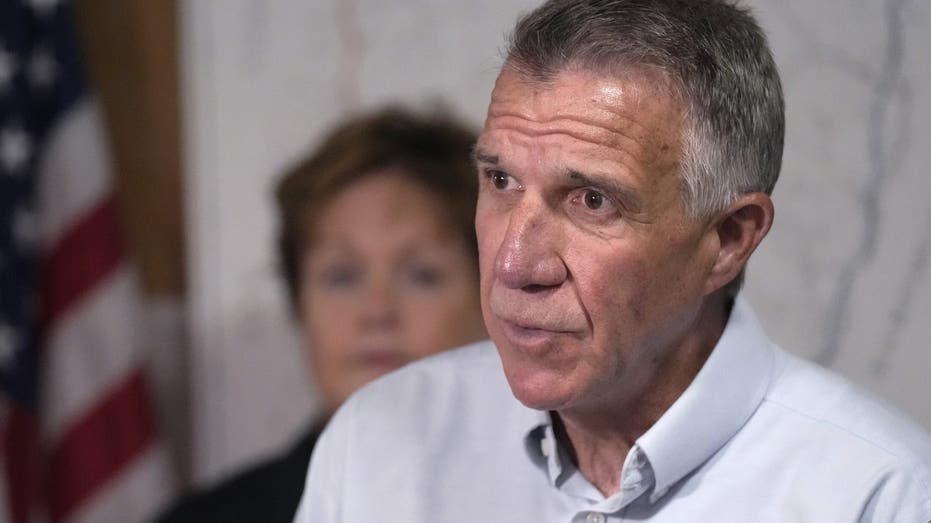
The Fox News Decision Desk projects that Republican Gov. Phil Scott of Vermont will win a fifth two-year term in office, easily defeating Democratic Party challenger Esther Charlestin. Scott, a former lawmaker and businessman who, according to public opinion polling, has long been one of the most popular governors in the nation. And Scott has now won five straight elections as governor in a heavily blue state. Vermont and neighboring New Hampshire are the only two states in the nation that hold gubernatorial elections every two years. CLICK HERE FOR THE LATEST FOX NEWS ELECTION 2024 UPDATES Charlestin, 34, is an educator, consultant, co-chair of the Vermont Commission on Women, a former member of her town’s selectboard. She’s also a first-generation Haitian American. Also on the ballot were independents Kevin Hoyt and Eli “Poa” Mutino, and minor party candidate June Goodband. Scott, in running for re-election this year, spotlighted that he would work to make Vermont more affordable and would push back against attempts by the Democrat-controlled legislature to increase taxes and fees. The governor had clashed with state lawmakers over spending and initiatives, as he vetoed eight bills this past session. The legislature overrode six of those bills. Scott, a moderate Republican, is a GOP critic of former President Trump. Get the latest updates from the 2024 campaign trail, exclusive interviews and more at our Fox News Digital election hub.
Fox News Voter Analysis: Is this a change election? Top issues and mood of the nation as voters weigh in
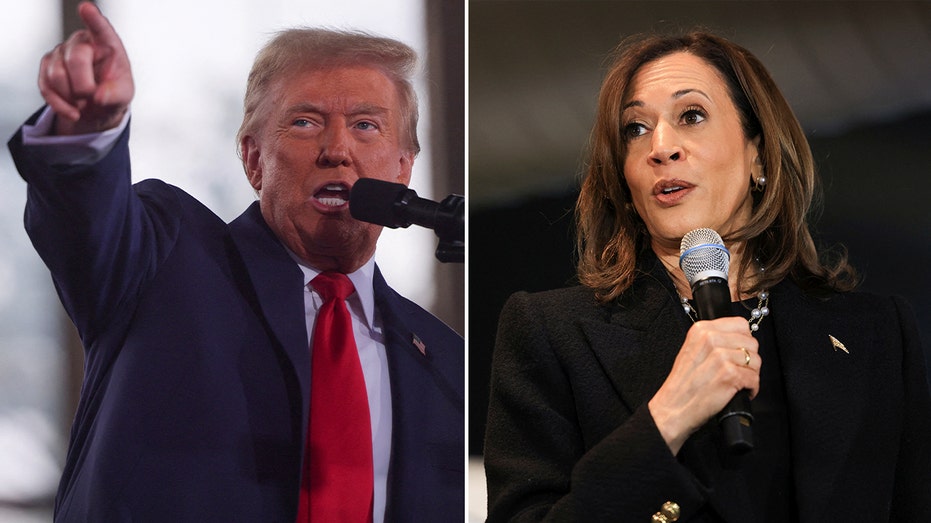
As the nation waits for election results, voters weigh in on the issues and whether former president Donald Trump or Vice President Kamala Harris will bring the kind of change they are looking for. Because it appears change is very much what they want. Economic concerns and worries about the future are major considerations as voters make their choice in this year’s election. Preliminary data from the Fox News Voter Analysis, a survey of more than 110,000 voters nationwide provide an early look at the mood of voters as they cast their ballots. This year, more voters headed to the polls believing the country was on the wrong track (70%) than in 2020 (60%). And voters across the country are seeking something different: most want a change in how the country is run, with a quarter (26%) seeking complete and total upheaval. LIVE BLOG: AMERICA TO DECIDE THE NEXT PRESIDENT OF THE UNITED STATES TODAY Voters’ frustrations with the Biden administration were readily apparent, as more than 5 in 10 disapprove of the job he is doing. By contrast, voters had net-positive recollections of Donald Trump’s time in office, with over half approving of the job he did as president. Four years ago, 47% approved of the job Trump had done. This desire for change is coupled with split views on the role of government. Slightly more than half say the government should be doing more to solve the country’s problems, a modest decline from 2020 (57%). Nearly as many (45%) think the government is doing too many things better left to the private sector. Voters say the economy is far and away the top issue facing the country, followed distantly by immigration and abortion. HEAD HERE FOR FOX NEWS UPDATES ON THE 2024 ELECTION Four in 10 voters say inflation was the single most important factor to their vote. Voters have dismal evaluations of the economy: two-thirds rated it as fair (40%) or downright poor (23%). Four years ago, in the depths of a coronavirus-induced recession, only 14% said economic conditions were poor. In a sign of inflation’s economic toll, roughly three times as many voters feel they were falling behind financially as feel they were getting ahead. Four years ago, roughly the same number said that they were getting ahead, however, the number who said they were falling behind was just 18% in 2020. Being able to afford food (67%) was the main budgetary concern for more voters than health care (54%), housing (51%), and gas (48%). On balance, voters had slightly more favorable views of Harris (48% favorable, 49% unfavorable) as a person than Trump (46% favorable, 52% unfavorable). The same is true at the vice-presidential level: views of Tim Walz (43% favorable, 41% unfavorable) were slightly better than opinions of JD Vance (42% favorable, 46% unfavorable). Robert F. Kennedy Jr., who ended his third-party presidential bid and endorsed Trump in August, was less popular than the two running mates (41% favorable, 43% unfavorable). The spotlight is not kind to Biden, whose sharply negative favorability rating (40% favorable, 57% unfavorable) slipped significantly from four years ago (50% favorable, 48% unfavorable). 2024 FNVA Methodology Statement: The Fox News Voter Analysis, conducted in partnership with the Associated Press, provides a comprehensive look at voting behavior, opinions, and preferences as America votes. It is based on surveys of the U.S. electorate conducted by NORC at the University of Chicago with voting results from The Associated Press. For the 2024 General Election, the FNVA results are based on a probability sample of registered voters drawn from state voter files, samples of self-identified registered voters from a probability-based national panel, and samples of self-identified registered voters from opt-in online panels. The FNVA survey of the American electorate was conducted in all 50 states, October 28 to November 5, concluding at the end of voting on Election Day. Get the latest updates from the 2024 campaign trail, exclusive interviews and more at our Fox News Digital election hub.
Major battleground states extend polling hours in key precincts: What to know
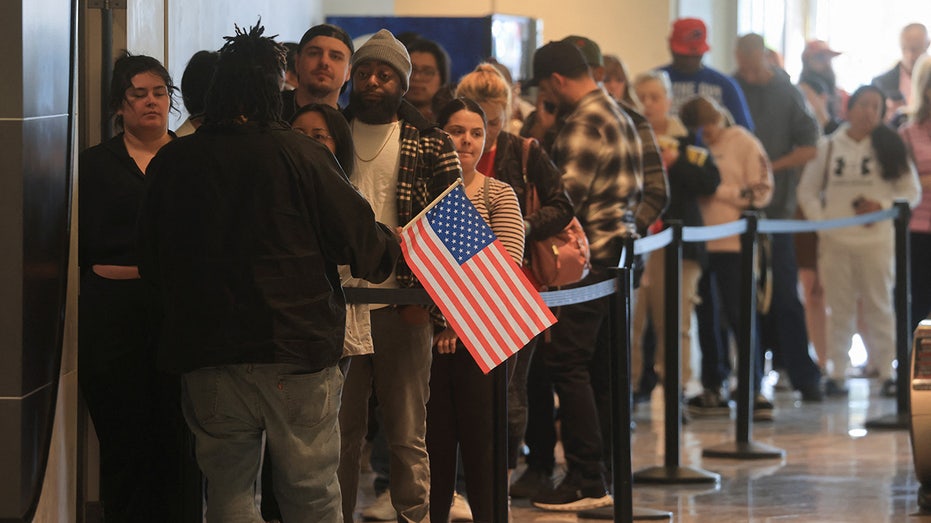
Several battleground states extended the hours of polling sites on Tuesday, citing unexpected wait times, technical issues, and other issues for voters in key precincts. Here’s a rundown of the states and precincts impacted so far. Pennsylvania In Pennsylvania, where state polling locations are scheduled to close at 8 p.m. voters saw extensions in Luzerne County, where local election officials said residents will have until 9:30 p.m. to cast their ballots. BATTLEGROUND STATES’ RECOUNT RULES VARY WIDELY, HERE’S A LOOK AT HOW THEY WORK Voters in line prior to 8 p.m. will still be able to vote in the county’s regular voting system, state officials said, and voters who get in line after 8 p.m. will be able to vote by provisional ballot. Earlier Tuesday, the Pennsylvania Department of State announced a two-hour extension of polling hours in Cambria County, citing a “software malfunction” that temporarily delayed the scanning of ballots in the precinct. Voters in Cambria County will have until 10 p.m. to vote, two hours after the 8 p.m. deadline, though any ballots cast after 8 p.m. must be made using provisional ballots. North Carolina In North Carolina, state election officials extended voting hours by 30 minutes in the precincts of Burke County and Wilson County. Voters there will have until 8 p.m. to cast their ballots — longer than the 7:30 p.m. deadline in the rest of the state. THE 1.6M VOTERS WHO COULD DETERMINE THE US ELECTION DON’T CURRENTLY RESIDE IN THE COUNTRY Georgia Georgia also announced an extension for voters in the Atlanta-area precincts of Cobb County, Fulton County, and Gwinnett County. Two polling sites in Fulton County were evacuated earlier Tuesday due to several “non-credible” bomb threats, prompting county officials to apply for an application to extend voting hours through 7:30 p.m. In Gwinnett County, officials said voters at a separate polling location that was also the target of a bomb threat will have until 8 p.m. to cast their ballots. This is a breaking news story. Check back here for updates. Get the latest updates from the 2024 campaign trail, exclusive interviews and more at our Fox News Digital election hub.
When will we know who won the US election?
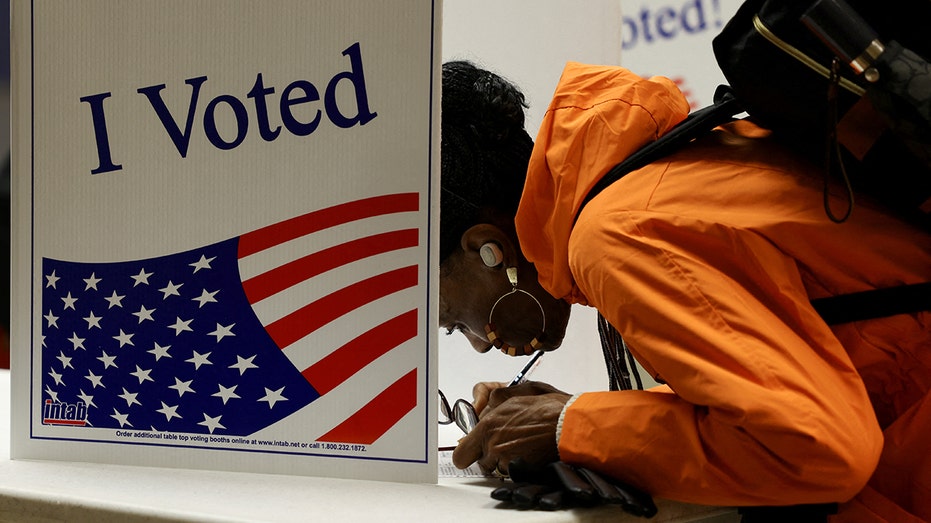
With millions of voters expected to show up to the polls today, the world will be anxiously watching for the election results to start pouring in on Tuesday night. Here is what you need to know about the 2024 presidential election results. THESE ‘BELLWETHER’ COUNTIES COULD DETERMINE NEXT PRESIDENT Kentucky (eight electoral votes) will be the first state to close its polls at 6 p.m. Eastern. For most of the eastern half of the country, voting polls will close between 7 p.m. and 9 p.m., while polls on the West Coast will close at 11 p.m. Eastern. The last states to close will be Hawaii (four electoral votes) and Alaska (three electoral votes), which will close their polls at midnight and 1 a.m. respectively. Election Day results have historically often been announced just hours after the polls close. However, recent elections have required longer waiting periods before all the votes can be tallied, and a winner can be declared. One reason for this is the prevalence of mail-in absentee voting. Fourteen states legally require that mail-in ballots be counted only after polls close on Election Day. 2024 VOTING: HERE’S WHEN POLLS CLOSE FOR ALL 50 STATES ON ELECTION DAY The first election results of the night will likely begin being called after 7 p.m. Eastern. Results for some of the critical swing states such as Pennsylvania (19 electoral votes) will likely not be called till much later. In 2020, news outlets called the election in President Biden’s favor four days after Election Day. In 2016, the race was called in Trump’s favor at 3 a.m. the day after Election Day. The closer the election, the longer it will take to know the result. Barring an unexpected landslide victory by either candidate, the winner of the 2024 presidential election may not be known until a day or several days after Election Day. Election results may also be further delayed by legal challenges by either former President Trump or Vice President Kamala Harris. With 270 Electoral College votes needed to win the presidency, the 2024 presidential election is expected to be extremely close. There are seven states – Pennsylvania, Arizona, Georgia, North Carolina, Michigan, Wisconsin and Nevada – considered close swing states. Experts will be closely watching these states as they will likely determine who the next president will be. Here is when polls will close in each of the swing states. 7 p.m. Eastern – Georgia (16 electoral votes) 7:30 p.m. Eastern – North Carolina (16 electoral votes) 8 p.m. Eastern – Pennsylvania (except for Cambria County, which will close at 10 p.m. Eastern due to electronic voting system software issues) 9 p.m. Eastern – Michigan (15 electoral votes), Arizona (11 electoral votes) and Wisconsin (10 electoral votes) 10 p.m. Eastern – Nevada (six electoral votes) You can stream Fox News election coverage live online. You can also keep track of the election results on Fox News Digital’s live election blog.
Adams, potential NYC mayoral challengers to rally support at Puerto Rico conference day after Election Day
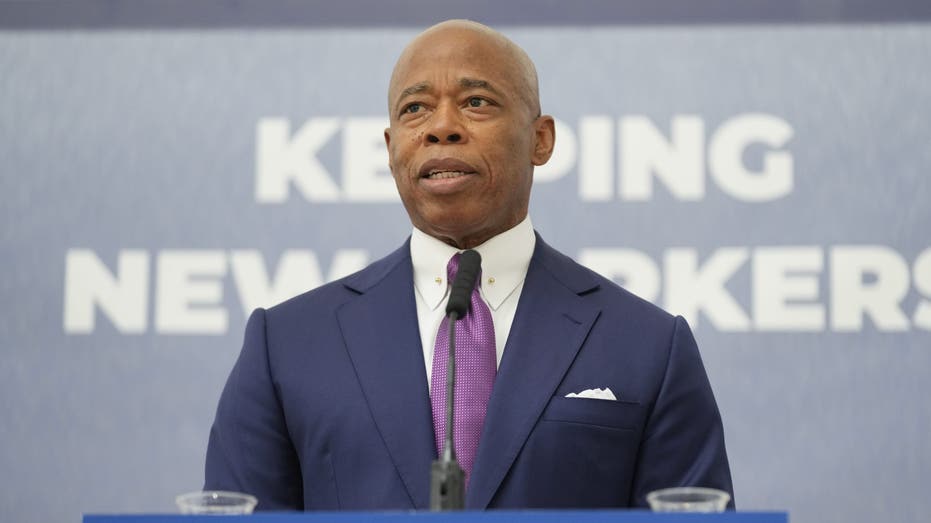
New York City Mayor Eric Adams said Monday he intends to attend an annual political conference in Puerto Rico the day after Election Day, as potential rivals of the incumbent Democrat mayor also will be in attendance to lobby for support in 2025. At his weekly press conference, Adams, who endorsed Vice President Harris for president and was a delegate at the Democratic National Convention in Chicago, was asked who he was voting for and if he planned on attending the SOMOS conference. “I always look forward to going to SOMOS. I think I’ve missed a couple of years. I’m planning on going, I’m not 100% sure. I would like to go,” Adams said. “It’s a good time to convene with folks in Puerto Rico. So, I have plans on going.” “But, you know, I got a lot of stuff going on I have to do in the city,” the mayor added a day before the Nov. 5 election. “And if I can get a lot done before next week, then I’ll definitely go. But I’m not going to stay long, no matter what. I made it clear who I endorse, and who I endorse is who I’m voting for. Made that very clear. I was a delegate in Chicago.” TRUMP DENIES KNOWING COMEDIAN WHO TOLD CRUDE JOKE ABOUT PUERTO RICO: ‘I HAVE NO IDEA WHO HE IS’ Last week, Adams raised eyebrows after repeatedly declining to criticize former President Trump, refusing to say when he last spoke with the Republican nominee or whether he was angling for a pardon should Trump win re-election. Trump has suggested that the DOJ indicted Adams for criticizing the federal government’s response to the migrant crisis. Trump also mentioned Adams by name at his Madison Square Garden rally, thanking the Democratic mayor for saying Trump should not be comparedto German dilator Adolf Hitler or be called a “fascist.” The annual SOMOS conference begins Wednesday in San Juan. Adams attended in 2021 and 2022. He did not go last year. Days before the conference was scheduled to start in 2023, the FBI seized Adams’ cell phone in connection to a federal corruption investigation. The Justice Department indicted Adams in September on bribery, campaign finance, and conspiracy offenses. The indictment accuses Adams of accepting flight upgrades and other luxury travel perks valued at $100,000 along with illegal campaign contributions from a Turkish official and other foreign nationals looking to buy his influence. In exchange, prosecutors say, Adams performed favors benefiting the Turkish government, including pressuring the fire department in 2021 to approve the opening of a consulate that it deemed unsafe. Adams held a different elected position at the time, Brooklyn borough president, but by then it was clear that he would become mayor. Adams has pleaded not guilty to the charges. His federal trial will begin next April, a judge ruled Friday, right in the thick of his promised reelection campaign. ANDREW CUOMO FACES DEMOCRATIC OPPOSITION AS RUMORS GROW THAT HE WILL MOUNT NYC MAYORAL BID: REPORT The SOMOS conference will provide an opportunity for any of Adams’ potential primary challengers to court support in Puerto Rico ahead of the 2025 mayoral election, City & State New York reported. Mayoral hopefuls already held their first candidate forum in the Bronx on the first day of early voting, according to the outlet. New York City Public Advocate Jumaane Williams, city Comptroller Brad Lander, state Sens. Jessica Ramos and Zellnor Myrie, former city Comptroller Scott Stringer and Assembly Member Zohran Mamdani were among those at that meeting. Rumors suggest former New York Gov. Andrew Cuomo will mount a mayoral bid. It’s unclear if he’ll attend SOMOS. U.S. District Judge Dale E. Ho set the mayor’s trial date on Friday, as Adams returned to Manhattan federal court for a hearing on his bid to eliminate a key charge in the indictment that threatens his political future. Ho said he’s confident the April 21, 2025, date will hold, “assuming nothing unexpected comes up.” At the same time, prosecutors said they still haven’t been able to crack a potentially crucial piece of evidence: Adams’ personal cellphone. According to his indictment, Adams changed his password just before giving the phone to authorities, then claimed he forgot it. Adams’ lawyers are fighting to throw out a bribery charge, one of five counts against the first-term Democrat. They argued the charge doesn’t meet the U.S. Supreme Court’s recently narrowed threshold for the crime and shouldn’t apply to Adams because it involves allegations dating to before he became mayor.
Battleground states’ recount rules vary widely, here’s a look at how they work
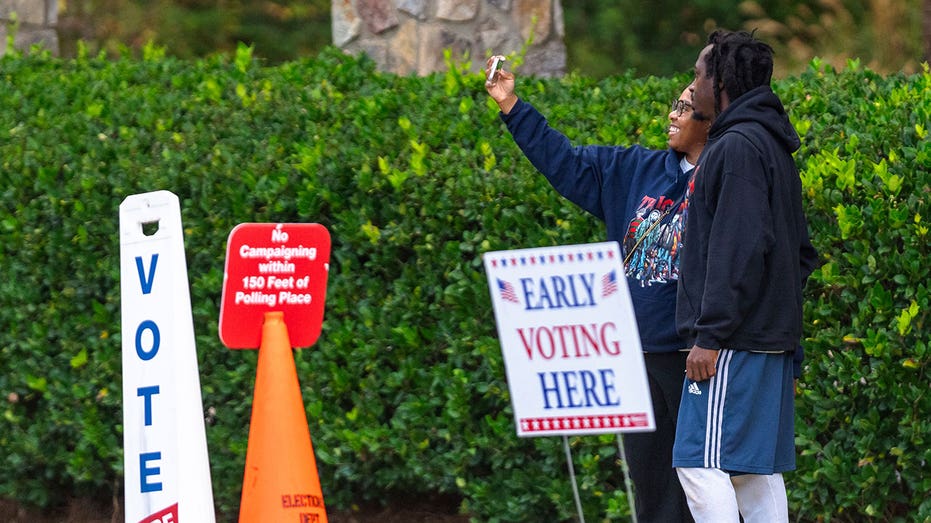
Each of the seven major battleground states has different rules governing how – and when – candidates can request ballot recounts in the event of a close election. Now, as voters continue to cast their ballots this Election Day, here’s a rundown of the rules each of the seven swing states – Arizona, Georgia, Michigan, Nevada, North Carolina, Pennsylvania and Wisconsin – use before ordering a recount, and the various types of recount requests candidates can legally submit. Arizona: Arizona law allows for an automatic recount if the candidate with the most votes leads the closest competitor by half of 1% or less of total votes cast for both contenders. Georgia: Georgia law does not require any automatic recounts – however, a recount can be requested by either candidate if the winner’s margin of victory is 0.5% or less. The request must be made within two days of the state’s certification of the results. Michigan: Michigan law allows candidates to request a recount on the grounds of “suspected fraud or error” within a precinct. The law requires candidates to submit their request – as well as a deposit – for each precinct where they are seeking a recount within six days of the conclusion of the canvassing process. Nevada: Nevada allows candidates to send a written request for a recount within three business days of its state result certification. Like Michigan, candidates must pay the advance deposit ahead of time to cover any estimated recount costs. The recount also must begin within five days of the Nevada Secretary of State’s office receiving the request. SUPREME COURT TEMPORARILY HALTS LOWER COURT RULING ORDERING 1,600 VOTERS BACK ON VIRGINIA VOTER ROLLS North Carolina: Candidates may submit a written recount request if the margin of victory is “less than or equal to half of 1% of the vote, or fewer than 10,000 votes,” according to the North Carolina General Assembly. The request must be made by noon on the second business day after the county canvas process concludes. Pennsylvania: Pennsylvania law allows three separate types of recounts: statewide automatic recounts ordered by the secretary of the commonwealth; recounts ordered by a county election board; and recounts that are ordered by the court. An automatic recount occurs if a candidate’s margin of victory is no more than 0.5% of total votes cast. In this case, a recount submission must be submitted to the Pennsylvania Secretary of State’s office no later than 5 p.m. on the second Thursday after Election Day. Any request for a court-ordered recount must be filed by at least three qualified electors within five days of the end of canvassing, according to the Pennsylvania Secretary of State’s office. An advance deposit is also required. In the case of any fraud, state laws allows relevant parties to have five additional days to continue counting ballots. Read more on Keystone State recounts here. Wisconsin: Wisconsin law allows candidates to file a sworn recount petition with the state clerk or local officer, stating both the areas they are seeking a recount in and their basis for requesting a recount. Candidates must indicate belief of mistake or fraud. The request must be made by 5 p.m. on the third business day after the board of canvassers certifies the election results, according to the Wisconsin State Election Board. Get the latest updates from the 2024 campaign trail, exclusive interviews and more at our Fox News Digital election hub.
Asia’s export-driven economies brace for upheaval under Trump
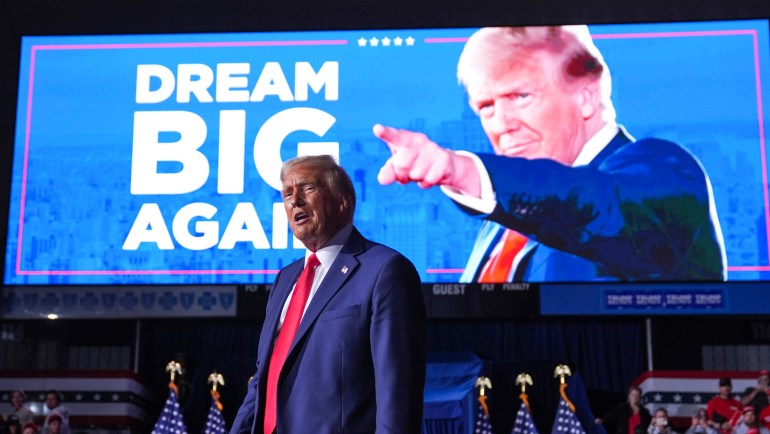
Taipei, Taiwan – Asia is bracing for disruption should American voters return Donald Trump to the White House, with his plans for sweeping tariffs threatening to hobble the region’s export-driven growth. Trump, who ran neck-and-neck with Vice President Kamala Harris in polls before Tuesday’s presidential election in the United States, has pledged to impose tariffs of 60 percent or more on Chinese imports and tariffs of 10 to 20 percent on all other foreign goods. The trade measures would come on top of tariffs on $380bn worth of Chinese goods that Trump imposed during his first term and current President Joe Biden kept in place. Trump’s duties could result in a particularly serious economic fallout in Asia, home to many of the world’s most trade-dependent economies. The 10 members of the Association of Southeast Asian Nations have an average trade-to-gross domestic product (GDP) ratio of 90 percent, double the global average, according to the Hinrich Foundation, a trade-focused philanthropic organisation based in Singapore. Emerging East Asia’s trade-to-GDP ratio is higher still, at 105 percent, according to the Brookings Institution, a Washington, DC-based think tank. “We can expect that there will be some type of move to turn US policy more protectionist, and that’s bad for Asia because most of the region’s economies, if not all the economies, are incredibly reliant on external demand – specifically demand coming from the US,” Nick Marro, principal economist for Asia at the Economist Intelligence Unit, told Al Jazeera. Former US President Donald Trump at a campaign rally in Grand Rapids, Michigan [Evan Vucci/AP] While parts of Asia benefited from the initial US-China trade war as companies shifted production away from China, the broad-based tariffs Trump has proposed this time around would inflict economic damage across the region, analysts said. Oxford Economics has said that “non-China Asia” would be a net loser with the region’s exports and imports predicted to fall 8 percent and 3 percent, respectively. Last week, Trump’s plans prompted a rare warning from the head of Singapore’s sovereign wealth fund, Rohit Sipahimalani, who said the tariffs could “create uncertainty” and “impact global growth”. “He’ll do what he said he’s going to do. He’ll impose tariffs, and he’ll impose them quickly,” Steve Okun, the founder and CEO of Singapore-based APAC Advisors, told Al Jazeera. “This is not going to be like the first term, where it’s going to be a year or two before he does anything.” With Chinese companies likely to divert more production to Southeast Asia to circumvent higher tariffs, Trump could also ramp up measures targeting exports from countries such as Vietnam, Malaysia and Thailand, Marro said. “These all point to a pretty worrisome outlook when it comes to the wider region,” he said. Asia could also potentially move to impose tariffs of its own to combat dumping by Chinese companies seeking markets to replace the US. Such concerns in January prompted Malaysia to impose a 10 percent tariff on certain low-value goods while Indonesia last month banned ultra-cheap Chinese e-commerce site Temu in a bid to protect domestic companies. In a number of cases, Trump has singled out particular economies over what he alleges are their unfair trade practices. Trump has, for example, repeatedly accused Taiwan of “stealing” the global chip industry from the US. Like China and Vietnam, Taiwan has a large trade surplus with the US, which is a source of aggravation for Trump, said Deborah Elms, head of trade policy at the Hinrich Foundation. “Not only is Trump obsessed with goods, but the metric that he uses for assessing whether the United States is winning or losing is a trade deficit in goods,” Elms told Al Jazeera. “If you are on the wrong side of that metric, … you’re going to be in trouble.” Despite many of these concerns, Trump may be no worse for the region than Harris if Biden’s protectionist policies are any guide to how his vice president might govern, said Jayant Menon, a senior fellow at Singapore’s ISEAS-Yusof Ishak Institute. While Biden is seen as less unpredictable than Trump, he not only kept his predecessor’s tariffs on Chinese goods but also imposed new tariffs affecting $18bn worth of imports including steel, semiconductors and electric vehicles. Biden has also implemented protectionist policies through legislation such as the CHIPS Act, which aims to boost semiconductor production in the US and keep advanced chips out of Chinese hands. Harris is widely expected to continue or expand Biden’s policies towards trade and industry although she has gone into little detail during the presidential campaign. “At the moment, it looks like from a purely protectionist stance Harris will be more protectionist, but there’s not that element of uncertainty and anti-globalisation that comes with Trump that can get out of control,” Menon told Al Jazeera. Shipping containers at a port in Singapore [Wong Maye-E/AP] Julien Chaisse, an expert in international economic law at the City University of Hong Kong, said that while Harris may be more of a team player than Trump on economic issues, she is likely to follow many of the same protectionist principles. “Harris may also pursue deeper cooperation with Asian allies on AI and cybersecurity to protect supply chains and counter Chinese influence in tech. Though less confrontational than Trump, Harris’s policy would likely maintain some scrutiny on Chinese investments in critical infrastructure across Asia,” Chaisse told Al Jazeera. Other observers in the region, such as Liew Chin Tong, Malaysia’s deputy minister of investment, trade and industry, have voiced similar sentiments. In an interview with The Straits Times this week, Liew said the difference between Trump and Harris was a matter of “intensity” rather than “direction”. “Trump will definitely take a far more isolationist and America First approach, but it doesn’t mean Harris will be able to take the world back to 1995 when the WTO [World Trade Organization] was formed,” Liew told the newspaper. Another difference between Trump and Harris could be simple timing. While Trump would be likely to take advantage
